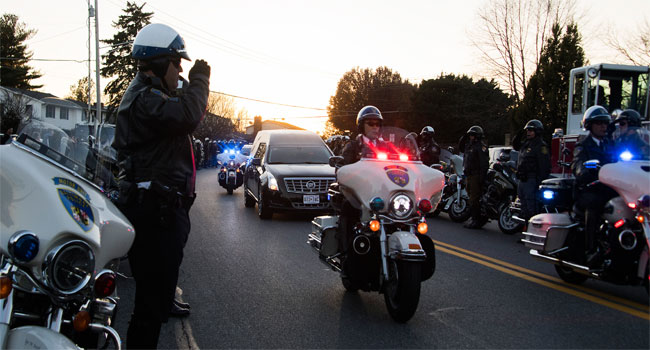
The mournful drone of bagpipes resounded and motorists moved aside as the funeral procession for a slain detective marched through Baltimore this week, the stars and stripes of the American flag punctuating the sea of blue-clad officers gathered to pay respects to one of their own.
In the procession from a Baltimore church service to a graveside ceremony, a police motorcade escorted the hearse of Sean Suiter, who was fatally shot in the head while pursuing a suspect in November, an unsolved murder that threatens to undermine already fragile public confidence and trust in the police here.
More than 3,000 people, most of them police officers from around the state, had packed the church in west Baltimore to attend the service for the 43-year-old detective — who had been set to testify in the trial of officers accused of corruption.
The killing of a police officer “leaves a stain on our city,” said Baltimore Mayor Catherine Pugh, leader of the largest city in Maryland with a long history of violent crime fueled by poverty and drug trafficking.
As of November 30, The Baltimore Sun recorded 319 homicides this year, more than the 318 in 2016, and approaching the record 344 in 2015.
That year, the city of 620,000 people — some two thirds of them African American — was hit by rioting and looting following the death of Freddie Gray, a 25-year-old black man who suffered a severed spine while being transported in a police van in a case that caused widespread outrage.
– Suspicion of conspiracy –
Suiter — who had served on the force for 18 years as well as in the Army — “lived and died a hero,” Maryland’s Governor Larry Hogan said during the ceremony, while making note of the “countless unanswered questions” surrounding his death.
The detective was killed with his own weapon, which was found at the scene, and police have not identified any suspects, despite offering a $215,000 reward for information.
Suiter was set to testify the following day in a court case against seven officers from the elite Gun Trace Task Force accused of extortion and theft during searches.
He had worked with at least three of the defendants in the course of his career.
But police have denied any link between his death and the trial.
“I understand the speculation that exists… It’s our responsibility really to follow the evidence and there’s no evidence whatsoever,” Baltimore police commissioner Kevin Davis said last week.
The killing and the lack of progress in identifying the perpetrator pose significant problems for the Baltimore Police Department, said University of Baltimore criminologist Jeffrey Ian Ross.
With no arrest, it “only increases the suspicion among the public and other observers that there may be some sort of conspiracy going on,” Ross said, adding it “was not a bad idea” to entrust the investigation to another police department or the FBI.
– ‘Vicious cycle’ –
The Baltimore Police Department has already experienced cases of internal corruption, but “this one is major and we will pay attention to the outcomes,” he said.
Suiter’s murder also came some two months after an epilogue to the Freddie Gray case, when the US Justice Department announced that it would not pursue charges against six police officers involved in his death due to “insufficient evidence.”
Gray’s death prompted a 14-month investigation into the BPD, which concluded that officers had disproportionately and illegally stopped, searched and arrested black people for years.
A federal judge then approved a consent decree mandating Baltimore’s police department to implement sweeping reforms — which Ross suggested makes officers “reluctant to get out of their car and initiate street stops.”
“They worry that it can lead to the next Freddie Gray incident,” he said, saying the situation creates “a vicious cycle.”
At Suiter’s funeral, fellow detective Jonathan Jones read a passage from the Bible’s 23rd Psalm, alluding to the challenges officers face: “Though I walk through the valley of the shadow of death, I will fear no evil.”
“As homicide detectives,” he said, “we go through the valley, we stay in the valley and we bring those out of the valley who are sometimes lost.”
“Sean was the epitome of that.”
AFP



